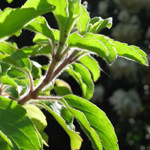The Magic of Herbs
Date Posted:6 July 2012

Herbs are seen in Ayurveda not just as powerful aids in restoring health and for rejuvenation, but also for awakening higher faculties and the deeper vital energies, or prana. Herbs work at the level of pranamaya kosha, the vital energy or pranic body. They link the body and mind together as they stimulate the flow of prana through the body and mind. Daily use of herbs benefits us all and like food, the benefits accrue over time.
According to Ayurveda, the sap of plants contain a powerful life essence that combines with the plasma (rasa) in the body giving nurture and promoting healing and transformation on all levels. So next time you are taking a herb, stop and consider the vital and powerful energy you are about to bless your body with!
This week we review 3 very powerful single herbs that are useful during winter months and anytime when a boost is needed.
Latin name Withania somnifera
Known as Winter Cherry or Indian Ginseng
Effects bitter, sweet, heating
Doshic Effect Vata and Kapha reducing and Pitta increasing.
Ashwagandha grows in the dryer regions of India, Africa and the Mediterranean. It is an adaptogen which means it works with your hormonal system to bring you back into balance. It modulates your endocrine system to help you feel better – whether you are up or down.
Ashwagandha has been used traditionally to help with issues linked to hormone imbalance – including stress, anxiety and metabolic disorders such as a sluggish or overactive thyroid. To learn more about how a good quality source of Ashwagandha helps to regulate the thyroid by increasing both T3 and T4 read here. This potent tonic herb can be taken regularly.
What else does it do?
Ashwagandha promotes natural energy, respiratory health, restful sleep, clear mind and memory. Rich in iron, it supports healthy hemoglobin, blood circulation and absorption of nutrients by cells. It nourishes the muscles, tendons, bones, nerves and fortifies the immune system. It is good for joint and nerve pain and for lowering anxiety. It helps to counter insomnia, calms the mind and promotes concentration meditation and deep sleep. It is even useful in sports medicine for increasing endurance and protecting the bones and joints from injury. To learn more about how to take it read here
Tulsi Organic (MA1928)
Latin name Ocinum sanctum
Known as Holy Basil it is different from the pesto variety of Basil
Effects pungent, bitter, light, dry, heating
Doshic Effect Kapha and Vata reducing and Pitta increasing
Tulsi is native to India, where it is often seen gracing shrines and homes as an aromatic perennial shrub. Tulsi is called ‘the wonder herb’ and it’s results can be quite wonderfu particularly for the respiratory system, or pranavaha srotas. Its heating and sharp qualities help liquefy mucus so it is excellent for colds, flu and sinus allergies. Tulsi is said to clear the mind and brain and promote wisdom and meditation. In India it is used in cough syrups to soothe the occasional cough, in Africa to support removal of parasites, and American colonists used Tulsi to ease occasional head discomfort.
Tulis is known to be an immune modulator that helps to balance and improve the immune response when fighting disease causing agents such as bacteria, viruses, microbes, allergens etc. It is also used for maintaining health and contains Vitamin A, C and antioxidants that help fight free radicals. To learn more about how to take it read here
Garlic Organic (MA1930)
Latin name Allium sativum
Known to contain allicin which has a similar effect as antibiotic penicillin.
Effects pungent, dry, heating
Doshic Effect Vata and Kapha and Pitta increasing
Garlic is widely grown in Latin countries bordering the Mediterranean and originated in Central Asia. It is a member of the onion family along with Chives, Leeks and Shallots. It’s name is of Anglo-Saxon origin and is taken from the shape of its leaves - gar (a spear) and lac (a plant). Garlic contains calcium, phosphorus, iron, thiamine, Riboflavin, niacin and vitamin C. It activates and strengthens your immune system and is a powerful antiseptic. Ayurveda considers Garlic one of the most effective antimicrobial herbs with anti-bacterial, anti-fungal and anti-viral properties.
Interesting Facts:
- Louis Pasteur (1822–1895) knew about the antibacterial properties of garlic.
- Albert Schweitzer (1875–1965) used garlic in Africa to combat diarrheal diseases caused by amoebas.
- France 1721 people successfully used garlic to protect themselves from infection during the plague.
- Garlic is a folk remedy for infections in India.


